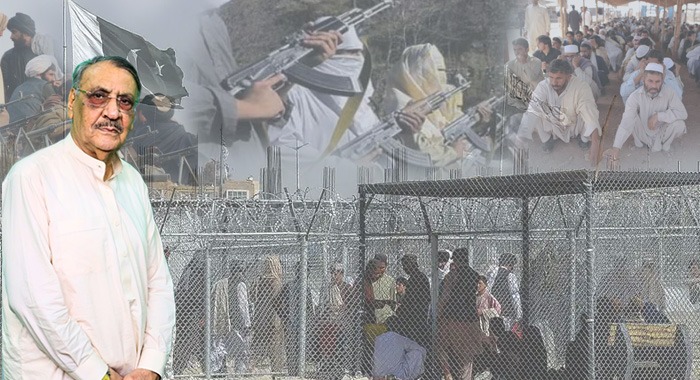The resurgence of terrorism in Khyber Pakhtunkhwa (KP) is not an isolated phenomenon, it is a direct consequence of the unchecked and expanding presence of international terrorist organisations based in neighboring Afghanistan. As of now, groups like Daesh-Khurasan, TTP (Tehreek-e-Taliban Pakistan), Al-Qaeda, and the Turkistan Islamic Party have not only found safe haven in Afghanistan but have also entrenched themselves across multiple provinces. Their leaderships operate freely, and their camps flourish, protected by the weak or complicit hands of the Taliban regime.
For Pakistan, this has created a two-pronged security crisis, external infiltration and internal facilitation. The recent wave of targeted attacks, ambushes, and the recovery of advanced weaponry and propaganda material point to a highly coordinated terror ecosystem operating with transnational support, routed primarily through Afghanistan.
The Local Factor: A Fragile Line of Defence
While local support for these groups is not widespread, even limited facilitation, often in the form of shelter, lookout assistance, or financial inducement, can provide the operational edge militants require. In volatile border districts, especially in the merged tribal areas, this micro-level collusion can have macro-level consequences.
It is imperative that community awareness is enhanced. Locals must be encouraged to report suspicious individuals, and identity verification mechanisms must be strictly implemented. Everyone should know who is living next door. If someone enters a village or town, it must be known why they are there, where they are from, and who they are visiting.
The Afghan Refugee Dilemma
It is no longer tenable to continue with open-ended extensions for undocumented Afghan nationals. There is mounting evidence that a significant proportion of terror facilitators, either directly or indirectly, emerge from within this unregulated population. The recent killing of a terrorist in Shamshato camp, who had infiltrated from Afghanistan with the help of Afghan hosts, is a glaring example.
A firm repatriation policy is needed. Once the state commits to deportation or legal restrictions, it must not backtrack under international pressure. Humanitarian considerations must not override the imperative of national security.
Afghanistan’s Taliban Government: Inaction or Complicity?
The Taliban regime has failed miserably in establishing the writ of the state. Despite having manpower, ideological motivation, and control over Afghan territory, it has chosen to harbour foreign terrorist elements rather than eradicate them. Their refusal to act against TTP, Daesh-K, and other groups, or to hand over wanted terrorists to Pakistan, is not just diplomatic defiance, it is strategic hostility.
Ironically, the Taliban themselves remain insecure and fractured. Their backward policies, such as banning girls’ education, are making them globally isolated and regionally destabilizing. Their refusal to clamp down on terrorist groups may eventually become the cause of their own collapse.
Border Management: From Patchwork to Perimeter
While Pakistan has made significant strides in fencing the western border and deploying paramilitary forces, gaps remain, both literal and procedural. Surveillance must be 24/7, and SOPs must be followed strictly. The notion of “relatives across the border” cannot justify unsupervised movement.
Special provisions for cross-border patients or family visits must come with strict biometric tracking. Anyone entering with multiple “attendants” must be documented, surveilled, and traced during their stay.
In some cases, resettlement incentives may be useful. Encourage dual-border residents to sell land on the Afghan side and settle permanently in Pakistan. As long as loyalties and lives are split across borders, national security will remain compromised.
Education, Modernity, and Ideological Warfare
Afghanistan’s anti-education policies, particularly against women, are not only regressive, they are strategically dangerous. A society denied knowledge breeds extremism. Pakistan, by contrast, has empowered women through education in even the most conservative areas. This ideological difference is now becoming a security fault line.
It is no surprise that radicalised youth in Afghanistan are attracted to extremist groups. Without avenues for employment, education, or civic participation, violence becomes a vocation.
A Policy of Deterrence and Preparedness
Pakistan cannot and should not attempt to stabilise Afghanistan, that is the responsibility of the Afghan state. However, the spillover effect is our burden, and one we must prepare for. This means:
Tightening intelligence networks in vulnerable districts
Investing in modern surveillance tech along the border
Community policing and informant networks in settled and merged areas
Swift deportation and legal action against illegal immigrants and facilitators
Clear and consistent communication with the Afghan Taliban, cooperate or face consequences
Most importantly, we must never lower our guard again. The post-9/11 wave of terrorism taught us this hard lesson through blood and sacrifice. Operations like Zarb-e-Azb and Radd-ul-Fasaad reclaimed our soil at a great cost. We must not allow that blood to be shed in vain by slipping into complacency now.
This is not just a law-and-order problem, it is a national security crisis with regional and ideological dimensions. If Afghanistan continues to implode, Pakistan must insulate. We must fortify our borders, unify our resolve, and deny any space; physical, digital, or psychological, to terrorism and its facilitators.
Because the cost of indifference today will be chaos tomorrow.





